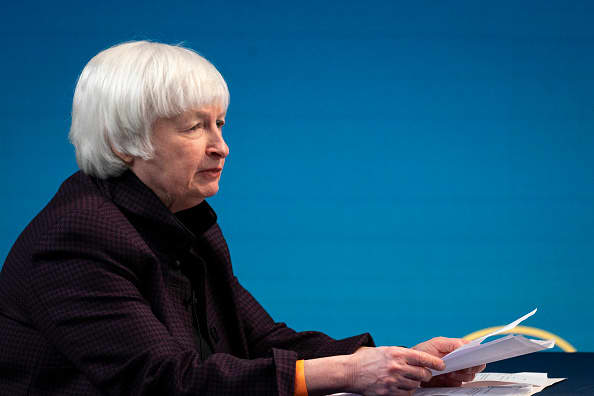Products You May Like
Banks have improved their capital positions and should be allowed to continue to buy back their own shares, Treasury Secretary Janet Yellen said Wednesday.
Regulators restricted share repurchases in 2020 for the biggest institutions in the country as a precautionary measure after Covid-19 reached pandemic status. After those banks passed a pandemic-focused stress test in December, the Federal Reserve said it would allow buybacks to resume, though with some restrictions.
Yellen, speaking Wednesday before the Senate Committee on Banking, Housing and Urban Affairs, said she agreed with allowing the share buybacks.
“I have been opposed earlier when we were very concerned about the situation the banks would face about stock buybacks,” Yellen said. “But financial institutions look healthier now, and I believe they should have some of the liberty provided by the rules to make returns to shareholders.”
They are expected to do just that as the buyback restrictions ease in the first quarter of 2021.
After financial sector companies repurchased just $80.7 billion worth of shares last year, that number likely will “significantly increase,” said Howard Silverblatt, senior index analyst at S&P Dow Jones Indices. Of that total, $46.6 billion came in the pre-restriction period.
In 2020, S&P 500 companies approved $519.7 billion in buybacks, a 28.7% decline from the previous year, according to Silverblatt.
The largest banks still have restrictions as they won’t be able to return to shareholders more than they made in profits the previous year.
The Fed’s move to allow buybacks to resume came after the largest institutions showed they could weather worst-case scenarios centered around the pandemic.
Central bank officials have largely praised the industry’s Covid response and said the too-big-to-fail firms remain well capitalized.
Warren targets BlackRock
However, Sen. Elizabeth Warren, D-Mass., said she doesn’t think regulators are going far enough in their oversight.
Specifically, she suggested that BlackRock, the institutional money management giant and leading ETF provider, also should be designated as a “systemically important financial institution” or SIFI — that is, a firm that could put the economy at risk if it were to collapse.
Warren and Yellen engaged in an at times contentious exchange over the issue, with Warren repeatedly interrupting the Treasury secretary as she sought to respond.
BlackRock is the largest money manager in the world, with nearly $9 trillion in assets. The firm last year helped guide the Fed when the central bank was buying corporate bonds.
Yellen said “it’s not obvious to me” that the “systemically important financial institution” designation would be “the correct tool to address” risks posed by asset management firms like BlackRock.
She did say that examining the issue will be part of the work she does with the Financial Stability Oversight Council in the coming days.
“I think it’s important to designate institutions whose failure would pose a material risk to financial stability,” Yellen said.
“I understand that when the stock market is going up, it can be easy to ignore risks that can be building up in the system,” Warren countered.
“That was the mindset of regulators that led up to the 2008 crash and that is how taxpayers ended up on the hook for a $700 billion bailout of the giant banks,” she added. “When the party is going strong, it’s the job of regulators to take away the punchbowl.”
A BlackRock spokesman said the firm already is heavily regulated but should not come under the same rules as banks.
“We support financial regulatory reform that increases transparency, protects investors and facilitates responsible growth,” the spokesman said.
“The past two administrations in the U.S. and numerous global regulators have studied our industry for a decade and concluded that asset managers should be regulated differently from banks, with the primary focus being on the industry’s products and services,” the statement continued. “BlackRock is not a bank, and as an asset manager, we are a heavily regulated company.”

